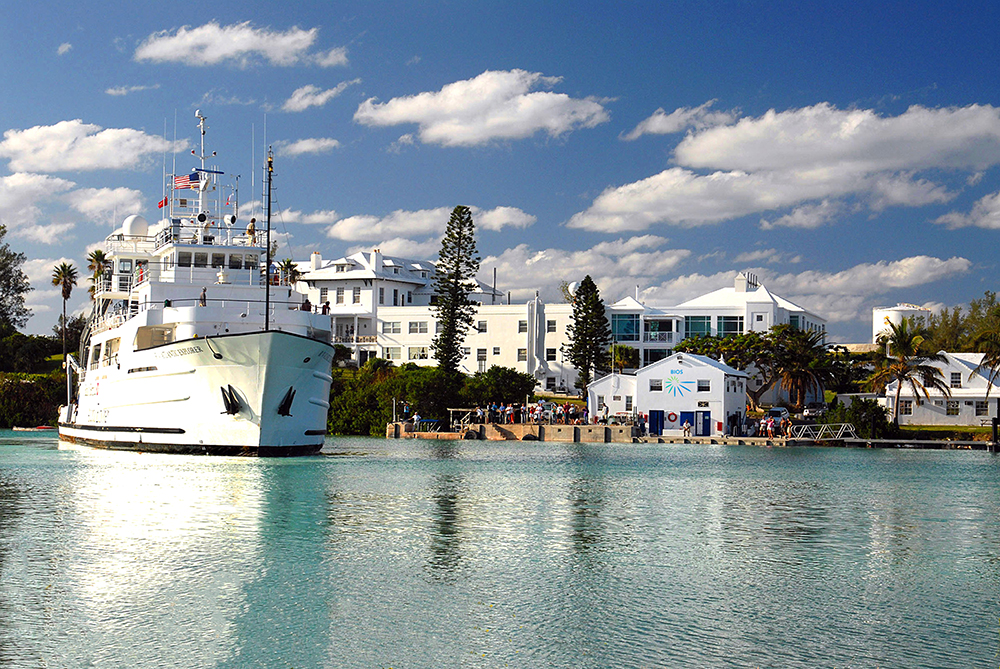BIOS Highlights Lionfish Threat
Source: Bernews
When more than 1,100 Bermudian primary school children took part in the BIOS Explorer program at the East End research facility in the winter of 2012, two colourful lionfish, Simba and Nala, were among the stars of the show
BIOS Explorer 2012: Gizmos and Gadgets to Study the Ocean
Our mission: to explore the ocean around Bermuda. Your challenge: to understand the tools scientists use to study it! In January 2012 over 1,100 primary school students participated in the Explorer program at the Bermuda Institute of Ocean Sciences, under the auspices of the newly established ‘Ocean Academy’
Read MoreHooked on Science
By Helen Jardine for Saltus Magazine Spring 2012
Saltus alum John Paul Skinner swears he has the “best job ever.” In his role as Education Officer at the Bermuda Institute of Ocean Sciences (BIOS), “JP,” as he likes to be called, regularly divides his time between running a number of diverse educational programmes and taking students into the field—“the really fun part,” he says, as it typically involves a boat ride out to Bermuda’s reefs
A Birds-eye View of Island’s Underwater Beauty
Source: The Royal Gazette
In the past, if you wanted to measure Bermuda’s reefs you had to don a scuba tank and dive, tape measure in hand; but now, a new scientist at BIOS, Dr. Eric Hochberg, hopes to get a little help from above
Unprecedented, Man-made Trends in Ocean’s Acidity
A team of international researchers has concluded that human-caused CO2 has increased ocean acidity far beyond their natural levels. The research was published online recently in the prominent science journal Nature
Read MoreDissecting the ‘Black Box’ of the Ocean’s Biological Carbon Pump
Join us on Thursday, March 8, for BIOS’s Science Talk series with Senior Scientist, Dr. Mike Lomas at XL House. Lecture begins at 6:30pm. Tickets are $10. RSVP Vanessa.Shorto@bios.edu or call 297-1880
Read MoreOcean Microbe Communities Changing, but Long-Term Environmental Impact Is Unclear
Source: Sciencedaily.com
ScienceDaily (Feb. 9, 2012) — As oceans warm due to climate change, water layers will mix less and affect the microbes and plankton that pump carbon out of the atmosphere — but researchers say it’s still unclear whether these processes will further increase global warming or decrease it
Trophic BATS Cruise
Follow Doug Bell, Research Technician, Phytoplankton Ecology Lab and colleagues from the University of South Carolina, Dauphin Island Sea Lab and Arizona State University, on a 10 – day research cruise aboard the R/V Atlantic Explorer
Read MoreOur Unique Pink Sand
Source: The Royal Gazette
Pink sand. It makes Bermuda’s beaches some of the most beautiful and picturesque in the world…but what makes it pink?
For Your Eddy-fication: Mesoscale Eddy Research at BIOS
For the past two decades, BIOS scientists have stood behind the idea that mesoscale eddies are a driving force in coastal and open ocean processes, including biogeochemical cycling and the global carbon cycle. As research technologies improved over this time period it became apparent that, not only were they correct, but that eddies are far more important to ocean and climate systems than previously imagined
Read More







